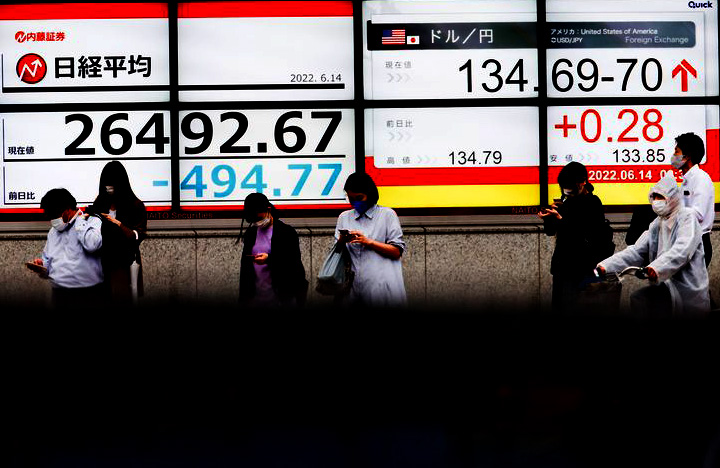Tokyo (Reuters) – After the European Central Bank (ECB) raised rates for the first time in more than a decade and bets on the size of U.S. rate hikes eased, Asian stock markets were on track for their best week in months, and the dollar held off recent record highs.
The Nikkei gained 0.24 percent on Friday and was expected to rise for the seventh consecutive day.It could be the best week for the index since March.
MSCI’s broadest index of Asia-Pacific shares outside of Japan fell 0.03 percent, but the index is still on track for its best week in about two months.
After dropping below parity last week, the euro was trading at $1.019 and was on track for its biggest weekly gain against the dollar since late May.
Overnight, the ECB raised interest rates by 50 basis points, which was more than expected. This was the first time in 11 years that rates were raised, and it ended a policy of negative interest rates that had been in place since 2014.
In a note, Susan Kilsby, an economist at ANZ, said the ECB was never going to move by more than 50 bps. “However, the 50 bps increase still came as a surprise to many. “But quickly raising interest rates is now the norm.”
The Hang Seng index in Hong Kong went up 0.14 percent, adding to the gains made the day before after China’s cybersecurity regulator fined Didi Global Inc. $1.2 billion. This could mean the end of the regulatory crackdown and make it easier for the ride-hailing giant to list in Hong Kong.
U.S. tech companies are likely to drag down U.S. stocks today. Nasdaq futures are down 0.68 percent after Snap Inc (NYSE:SNAP) reported poor earnings, sending investors running for the hills.
Snap’s warning that a slowdown in the economy could hurt internet companies caused the share price to drop by almost 27 percent after hours. Later today, Twitter Inc. (NYSE:TWTR) will report its earnings.
Bitcoin, the most popular cryptocurrency, was down 0.48 percent on Friday to $23,017.15, but it’s up more than 10 percent for the week, which would be its best week since March.
On Friday, oil prices went up, and it looked like they would go up for the first week in more than a month. Brent crude futures went up 1.5% to $105.45 per barrel, and U.S. WTI crude futures went up 1.5% to $97.75 per barrel.
Next week, the U.S. Federal Reserve will meet to set interest rates. Prices are now based on a 75-bp move instead of a 100-bp move.

